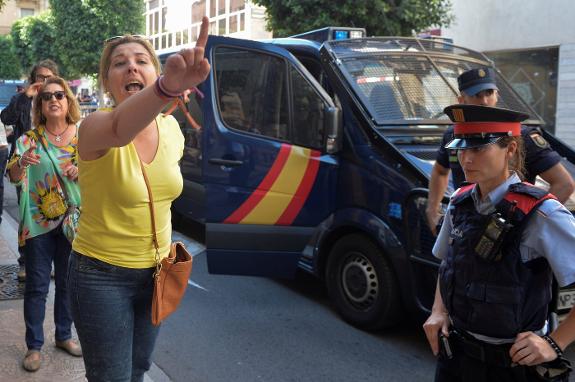First major bank quits Catalonia after week of crisis and tension
Banco Sabadell, one of Spain's biggest banks, is to move its registered head office out of the region due to customers' fears following illegal independence vote and general strike
SUR
Viernes, 6 de octubre 2017, 09:46
The crisis in Catalonia took a new twist on Thursday when Spain's constitutional court placed a temporary ban on the Catalan regional parliament meeting to debate the results of last Sunday's banned referendum.
The session with regional MPs has been planned for Monday, with the possibility that the separatist majority may approve a unilateral declaration of independence.
The court ban was in response to a complaint by the regional Socialist party, however early indications were that separatist MPs would ignore the ruling and attend anyway.
Bank pulls out
After a week of high drama in Catalonia and charged emotions across Spain, the court decision comes as signs grow that more Barcelona-based banks and companies will be moving their registered offices out of Catalonia, protecting their businesses from any possible forthcoming independence decision. On Thursday afternoon Banco Sabadell, which also owns Solbank and TSB in the UK, was set to approve a move of its registered office to Alicante.
Illegal referendum
Despite extra police being drafted in from across Spain to try to prevent the illegal vote taking place, most polling stations opened as expected last Sunday with ballot boxes in place. The regional government said that over two million Catalans voted, a 43 per cent turnout, and that 90 per cent had backed independence.
However the violent altercations on the day between police and voters, and accusations of malpractice, including reported evidence that some people had voted several times in different polling stations, caused many to call into question the legitimacy of the voting and electoral observers declared the referendum invalid.
Speaking after the vote and the accompanying disturbances, regional president, Carles Puigdemont reaffirmed his government's commitment to carry on with its plan towards independence.
Spanish prime minister, Mariano Rajoy called for calm, saying, We can't allow agreement to be replaced by blackmail by a few people.
General strike called
On Tuesday, a general strike in Catalonia was called in protest at what many felt were heavy-handed tactics against voters by National Police and Guardia Civil officers on duty during Sunday's banned vote. The stoppage principally affected transport networks and small businesses.
There were also reports on Tuesday that some of the police that had been drafted into the region from the rest of Spain were being ordered by locals to vacate their hotel rooms. In the coastal town of Pineda de Mar protesters gathered at the doors of the hotel where National Police officers were staying.
Pressure on the 'Mossos'
As expected, the difficult position of Catalonia's own regional police force, known as the Mossos d'Esquadra, was further brought to the fore during Sunday's voting. There was support for the Mossos from many Catalan residents for their lighter touch in policing the controversial vote.
Pressure was further piled on the Mossos force this week when it was announced that their head, Josep Lluís Trapero, and others are to be formally investigated for allegedly failing to protect Guardia Civil officers who were carrying out searches of Catalan government offices last month.
Spanish political reaction
As news of the events in Catalonia last Sunday burst onto the world's front pages, Spain's politicians clashed over the best way out of the impasse.
Mariano Rajoy's central government continued with its policy of not entering into negotiation while the regional government maintained its separatist stance.
Meanwhile the centrist Ciudadanos party called for Rajoy to invoke Article 155 of the Spanish constitution, which allows Madrid to temporarily intervene in an autonomous region.
The PSOE Socialist party, while defending the unity of Spain, offered itself up to mediate between Rajoy and Puigdemont. Left-wing alliance Unidos Podemos continued its calls for a legal vote on independence to be permitted in Catalonia.
The King's speech
As people across Spain wondered what next for the region, King Felipe VI addressed the nation on television on Tuesday night.
In a determined speech, he reiterated the need for Spain's constitution to be upheld and criticised the defiance of the Catalan government.
